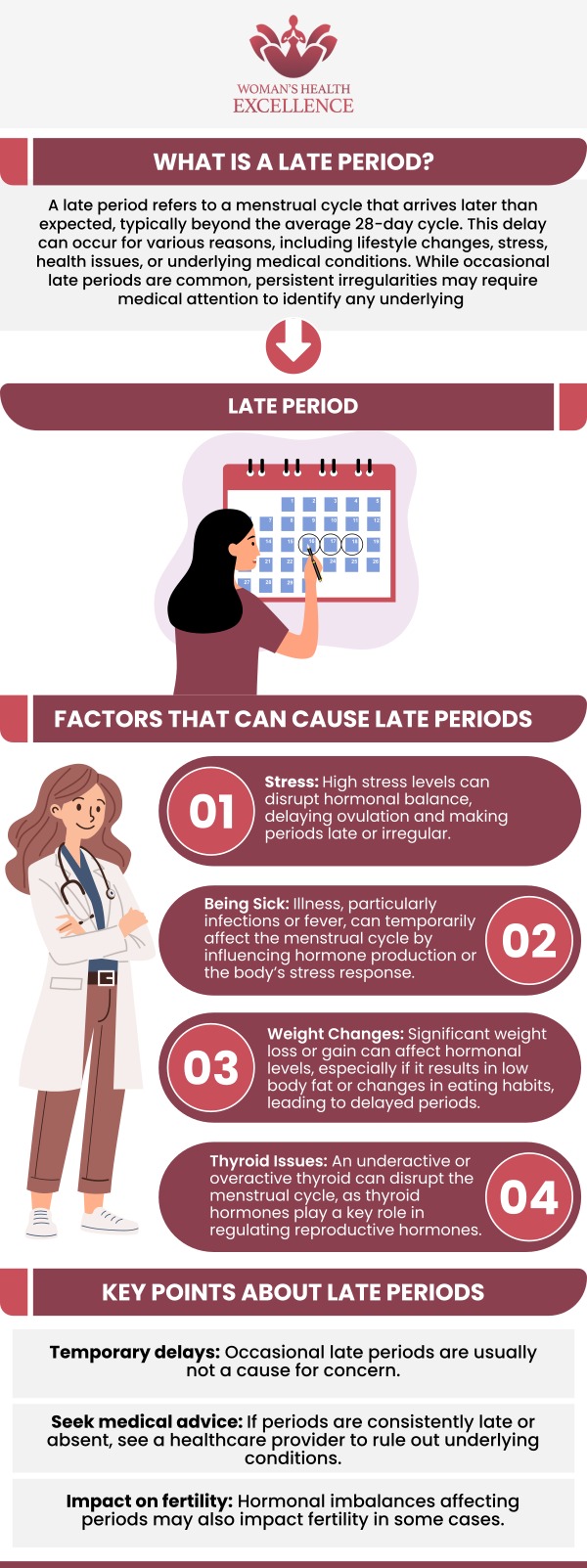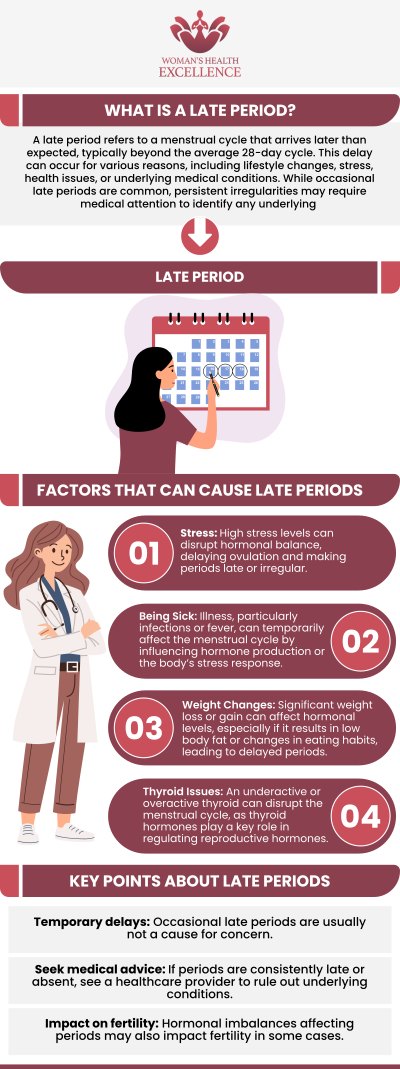What causes a late period with a negative pregnancy test and Cramping
Cramping with a late period and a negative pregnancy test can be unsettling, but it’s not uncommon. This combination of symptoms may be caused by stress, hormonal shifts, ovulation irregularities, or underlying conditions like PCOS. Dr. Prema Kothandaraman at The OB-Gyn & Incontinence Center offers thorough evaluations to pinpoint the cause and provide clarity. With personalized care, our team helps patients understand their cycles and get relief from confusing or uncomfortable symptoms. Our clinics are located in Arcadia, CA, and Glendale, CA. For more information, contact us today or book an appointment online.


Table of Contents:
Is it common to have a late period, cramping, and a negative pregnancy test?
What causes cramping when my period is late and my pregnancy test is negative?
Should I retake the pregnancy test if I’m still 8 days late and cramping?
Could my cramping be due to something other than a late period or pregnancy?
At The OB-Gyn & Incontinence Center, we understand that experiencing a late menstrual period accompanied by cramping, despite receiving a negative pregnancy test, can feel confusing and concerning. However, menstrual irregularities are quite common among women and can arise from a variety of factors.
Your menstrual cycle may fluctuate due to stress, lifestyle changes, hormonal shifts, significant weight gain or loss, intensive physical activity, or underlying medical conditions such as polycystic ovary syndrome (PCOS) and thyroid disorders. Additionally, cramping without menstruation can result from hormonal fluctuations, uterine contractions, or other gynecological conditions unrelated to pregnancy.
While a negative pregnancy test typically indicates that you are not pregnant—particularly when taken correctly after a missed period—we strongly recommend scheduling an appointment if your period continues to be irregular or absent, or if your cramps become persistent or unusually intense. At The OB-Gyn & Incontinence Center, our compassionate healthcare providers specialize in thoroughly evaluating menstrual irregularities.
Experiencing cramping when your period is late, accompanied by a negative pregnancy test, is a common concern we see at The OB-Gyn & Incontinence Center. Several factors can lead to these symptoms, and our specialists can help identify and address the underlying causes.
Hormonal fluctuations often play a significant role, triggered by factors such as late-period stress, diet changes, variations in exercise routines, or shifts in lifestyle. These hormonal changes may cause uterine contractions and cramping even when menstruation is delayed.
Another common cause we evaluate at our center is ovarian cysts, especially functional cysts, which naturally occur during your menstrual cycle. These cysts can sometimes become enlarged or rupture, leading to pelvic discomfort or cramping.
We also carefully assess conditions such as endometriosis and pelvic inflammatory disease (PID), which can cause cramping independent of pregnancy. Endometriosis involves the growth of uterine tissue outside the uterus, resulting in pain and cramping. PID, typically caused by infections, can similarly lead to persistent pelvic pain and discomfort.
Hormonal imbalances such as thyroid dysfunction—either hyperthyroidism (overactive thyroid) or hypothyroidism (underactive thyroid)—can disrupt menstrual cycles, causing delayed periods and cramping. Additionally, polycystic ovary syndrome (PCOS), another common hormonal condition we treat, may cause irregular cycles, delayed menstruation, and associated pelvic discomfort.
Lastly, it’s important to consider that a pregnancy test taken too early or incorrectly may yield a false-negative result. If your period continues to be delayed and you experience ongoing cramping, we encourage retesting after several days or scheduling an appointment at The OB-Gyn & Incontinence Center. Our experienced providers can ensure an accurate diagnosis and personalized care plan, addressing your symptoms and helping you achieve optimal reproductive health and comfort.
At The OB-Gyn & Incontinence Center, we understand that experiencing a delayed period accompanied by cramping can create uncertainty and stress. If your period is eight days late and you are noticing cramping, you may be wondering whether you should retake your pregnancy test. Although home pregnancy tests typically yield accurate results starting around the first day of a missed period, sometimes early pregnancy hormone (hCG) levels might initially be too low, resulting in a false-negative outcome. Because hCG levels rise quickly during early pregnancy, we recommend retaking the test after waiting several days to achieve a more definitive result.
Cramping can occur due to a variety of reasons, including early pregnancy, delayed periods, hormonal fluctuations, stress, or other gynecological conditions. Mild cramping can often be normal in early pregnancy, but it is also common just before menstruation begins.
If your period continues to be delayed and you still experience symptoms, we suggest retaking the pregnancy test using your first-morning urine, as this usually has the highest concentration of pregnancy hormones, providing a clearer result. If your second test is also negative and your period still hasn’t started, or if your cramping persists or intensifies, please contact us at The OB-Gyn & Incontinence Center. Scheduling an appointment with our skilled medical team can help clarify your situation, rule out pregnancy or other medical conditions, and provide you with personalized care and peace of mind.
At The OB-Gyn & Incontinence Center, we understand that abdominal and pelvic cramping can occur for various reasons beyond pregnancy or menstruation, and we’re committed to helping you identify and manage the underlying cause.
One common gynecological cause is ovulation, when women may experience mild mid-cycle cramping (known as mittelschmerz). These cramps typically occur around the midpoint of your menstrual cycle and can last anywhere from a few minutes to several hours.
Digestive issues may also lead to abdominal discomfort. Conditions such as constipation, gas, bloating, or irritable bowel syndrome (IBS) can cause cramping sensations. These digestive-related cramps often improve with dietary modifications, proper hydration, and over-the-counter remedies designed to ease gastrointestinal discomfort.
Various gynecological conditions, including ovarian cysts, uterine fibroids, pelvic inflammatory disease (PID), and endometriosis, can also cause abdominal or pelvic pain. For instance, ovarian cysts may result in sharp or dull pain on one side of the lower abdomen, while endometriosis commonly causes persistent pelvic pain, especially during menstruation, intercourse, or bowel movements. At The OB-Gyn & Incontinence Center, our specialists are skilled in diagnosing and treating these conditions to help you find relief.
Additionally, urinary tract infections (UTIs) or bladder infections frequently lead to lower abdominal and pelvic discomfort, along with burning sensations during urination, frequent urgency, and sometimes cloudy or foul-smelling urine. Prompt evaluation and treatment with antibiotics from our practice can quickly resolve these symptoms and help you feel better.
Stress and anxiety can also physically manifest as abdominal and pelvic discomfort. Hormonal fluctuations and muscle tension due to stress may cause sensations of pain or unease in the pelvic region. Our compassionate providers can discuss stress-management techniques and associated causes of late periods.
Strenuous exercise or physical activity can occasionally lead to muscular cramps or strain in the lower abdomen or pelvic area, particularly if your muscles are not accustomed to the intensity or type of activity. Hydration, gentle stretching, and adequate rest typically ease this type of discomfort.
Because abdominal and pelvic cramping can be associated with various conditions, it’s important to monitor the severity, duration, and any additional symptoms you experience. If cramping persists, worsens, or is accompanied by concerning symptoms such as fever, heavy bleeding, nausea, vomiting, dizziness, or urinary symptoms, please contact our team.
Getting answers early can help you feel more in control and ensure any underlying conditions are addressed promptly. Don’t wait or guess—your symptoms deserve professional attention. Our clinics are located in Arcadia, CA, and Glendale, CA. For more information, contact us today or book an appointment online. We serve patients from Arcadia CA, Glendale CA, Monrovia CA, Pasadena CA, Los Angeles CA, Burbank CA, and surrounding areas.


Additional Services You May Need
▸ Urogynecology
▸ Minimally Invasive Gynecology
▸ Monalisa & Medical Aesthetics
▸ Bioidentical Hormone Replacement Therapy
▸ Urinary Incontinence
▸ Pelvic Organ Prolapse
▸ Painful Bladder
▸ Urinary Tract Infection
▸ Genitourinary Syndrome of Menopause
▸ Female Sexual Dysfunction
▸ Urinary Retention
▸ Vaginal Laxity & Prolapse
▸ Postpartum Pelvic Floor Problems
▸ PCOD
▸ Bladder Prolapse Repair
▸ Urgent PC
▸ Fibroids
▸ Excessive Bleeding
▸ Pelvic Pain
▸ Birth Control & IUD
▸ Vaginal & Pelvic Infection
▸ Monalisa Touch
▸ STD
▸ TempsureVitalia
▸ Biote Pellet Therapy
▸ Topical BHRT
▸ Flexsure
▸ Rectal Prolapse Repair
▸ Tempsure ENVI
▸ Minimally Invasive Pelvic Surgery for Incontinence



